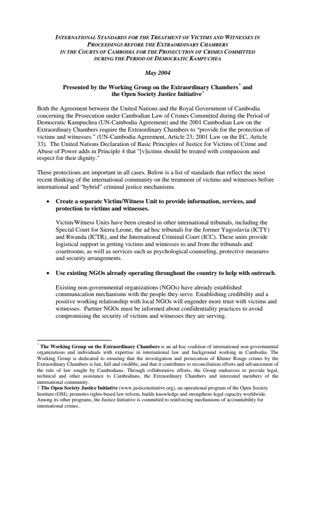Standards for the Treatment of Victims and Witnesses in Cambodia's Extraordinary Chambers
Presented by the Working Group on the Extraordinary Chambers and the Open Society Justice Initiative
Both the agreement between the United Nations and the Royal Government of Cambodia concerning the prosecution under Cambodian law of crimes committed during the period of Democratic Kampuchea (UN-Cambodia Agreement) and the 2001 Cambodian law on the Extraordinary Chambers require the court to "provide for the protection of victims and witnesses" (UN-Cambodia Agreement, Article 23; 2001 Law on the EC, Article 33). The United Nations Declaration of Basic Principles of Justice for Victims of Crime and Abuse of Power adds in Principle 4 that "(v)ictims should be treated with compassion and respect for their dignity."
These protections are important in all cases. Below is a list of standards that reflect the most recent thinking of the international community on the treatment of victims and witnesses before international and hybrid criminal justice mechanisms.
- Create a separate Victim/Witness Unit to provide information, services, and protection to victims and witnesses.
- Use existing nongovernmental organizations already operating throughout the country to help with outreach.
- Ensure that witnesses are "not prosecuted, detained or subjected to any other restriction on their liberty... or... subjected by the authorities to any measure which may affect the free and independent exercise of their functions" (UN-Cambodia Agreement, Article 22).
- Develop a confidentiality policy to keep all sensitive information secure.
- Provide detailed information about the investigation and trial process to potential witnesses so they can make an informed decision about whether and how to participate.
- Consider the need for security when talking to victims and witnesses.
- Institute protective measures to protect the integrity or security of a witness, including but "not... limited to, the conduct of in camera proceedings and the protection of the identity of a victim or witness" (UN-Cambodia Agreement, Article 24; 2001 Law on the Extraordinary Chambers, Article 33).
- Train investigators and other court personnel in dealing with traumatized victims, including survivors of sexual violence.
- Ensure victims' needs are addressed in the court's rules of procedure and evidence, including the needs of survivors of sexual violence.
- Provide psychological support to victims and witnesses who testify.
- Communicate with victims and witnesses regarding the progress of the trial and the eventual outcome.
- Establish procedures to protect victims and witnesses after the trial.
Topics
- Climate Justice
- Digital Rights and Fair Elections
- Discrimination and Racial Justice
- International Crimes
